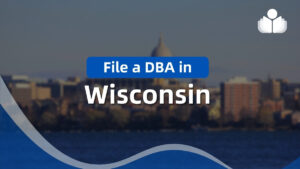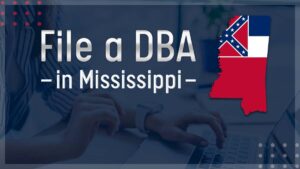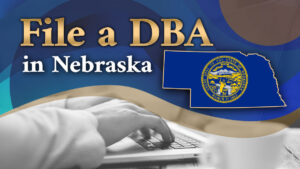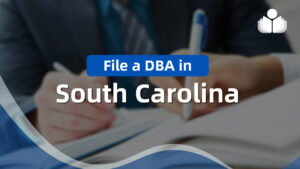If you’re interested in the significance of DBA registration in Texas and the steps involved, you’re in the right place.
In Texas, a DBA (Doing Business As) allows individuals to operate under a different business name for marketing, sales, and legal purposes. It’s similar to other states where it might be called a fictitious name, assumed name, or trade name.
However, unlike a Limited Liability Company (LLC), a DBA doesn’t establish a formal business entity or offer similar benefits. Often, setting up an LLC in Texas is more advantageous because of tax incentives and legal protections that provide stronger support for your business.
What Is a Texas DBA (Assumed Name)?
In the realm of business, every entity possesses a designated legal business name. For sole proprietors, this legal name coincides with their own personal name. With LLCs or corporations, the legal name aligns with the one stated in their formation documents.
A DBA (Doing Business As) serves as an alternative label that can be used instead of one’s legal name. By registering a Texas DBA (also called an assumed name), businesses can function almost identically to how they would under their legal names.
This includes leveraging the DBA for marketing purposes in print and online advertising mediums, establishing a business bank account, and conducting transactions such as writing vendor checks or accepting customer payments. Understanding that a DBA doesn’t constitute a separate legal entity or provide asset protection is crucial.
It simply functions as an alias through which one can operate their business affairs. To safeguard personal assets effectively, it becomes necessary to establish a formal entity like a Texas LLC or corporation.
Why Would a Business Need a DBA?
Operating under a DBA, an assumed name, trade name, or fictitious name, offers many advantages for small businesses and startups. One compelling reason to consider a DBA is when Texas law mandates sole proprietors to conduct business using their legal names.
These entrepreneurs gain the flexibility to operate under an alternate business name by obtaining a DBA. Using a DBA provides other benefits, such as:
- Establish a new line of business with a name distinct from your current one.
- Operate separately from an LLC or corporation without initiating a new company or modifying existing LLC operating agreements or corporate bylaws.
- Obtain a tax ID number from the Internal Revenue Service (IRS) to avoid using a personal Social Security number as a sole proprietor for business purposes.
- Establish a bank account under the DBA name.
- Opt for a more memorable or search-engine-optimized name than your current one.
- Develop a business identity corresponding to an available internet domain name, particularly if expanding your online presence.
If you’re considering registering a Texas DBA for your business, adhere to the following steps for a valid assumed name registration.
Why Hire a Professional Service to File a DBA in Texas?
To ensure a smooth and successful outcome when registering a DBA in Texas, navigate several crucial steps carefully. Mistakes could lead to a denied application or even more severe consequences.
The state authorities in Texas have the power to impose fines or close down your business if they find that you have improperly used a name in legal or business contexts. However, there are professional services available that can help alleviate any worries or uncertainties associated with the DBA process.
These professionals possess an extensive understanding of the specific requirements in Texas and can assist you in selecting an optimal name before starting the paperwork. These firms offer various services, such as LLC filing, which can be invaluable as your business expands.
After conducting thorough research, we have identified the top professional services that are specifically tailored to meet your DBA requirements in Texas:
Step 1: Choose a Name for Your DBA
Selecting a name for your Texas DBA can be more challenging than brainstorming ideas that suit your business. It’s essential for your DBA to not only be catchy and memorable but also unique.
This means you’ll have to research to determine if your preferred name is available or if alternative options have yet to be claimed. Thankfully, the internet has made it convenient to search for a name and find out if it has already been registered.
If you have a sole proprietorship or partnership, you must contact your county clerk and verify whether the desired DBA has already been claimed.
The Secretary of State maintains a comprehensive list with contact information for Texas county clerks. The Secretary of State’s website must be used for LLCs and corporations, with each search incurring a $1 fee.
When selecting a DBA, the next step is to verify whether your chosen name is subject to state or federal trademark protection. While using a trademarked term or name as your DBA isn’t prohibited, doing so may expose your business to legal consequences.
If your business uses a trademarked name or term without permission, the trademark owner can take legal action against you. This can include seeking damages if they can show that unauthorized use of their trademark has harmed their business.
Although there isn’t a legal requirement, ensure that your chosen DBA (or something similar) is available as an internet domain name. This will help ensure clarity for individuals searching for your business online and ensure that those familiar with your company will easily remember and find its website.
Step 2: Check for Prohibited Words
Businesses in Texas are prohibited from using certain words in their names unless they have obtained permission and meet specific business criteria, as outlined in the Texas Administrative Code.
- Avoid using “Olympic” or “Olympiad” without permission from the U.S. Olympic Committee.
- Refrain from incorporating terms like “Bank,” “Trust,” “Bank and Trust,” or “Trust Co.” (or similar terms in foreign languages) without a letter of no objection from the Banking Commissioner.
- Exercise caution when employing terms such as “University,” “College,” “Medical School,” “School of Medicine,” “Health Science Center,” “School of Law,” “Law Center,” or “Law School” (or similar terms in other languages) without a “no objection” letter from the Texas Higher Education Coordinating Board.
- Avoid using terms like “Veteran,” “Disabled,” “Legion,” “War,” “Foreign,” “Spanish,” or “World War” if they imply the entity was established without written approval from a veterans organization for the benefit of veterans or their families.
Note that using specific terms is prohibited when registering a DBA.
- Terms suggesting a governmental association
- Highly objectionable language
- Terms insinuating a business purpose not legally permitted
Names that include Roman or Arabic numerals or symbols commonly found on a regular keyboard are generally considered appropriate.
Step 3: Register Your DBA
To register your Texas DBA successfully, you must choose one of two registration locations based on your business structure.
Sole Proprietors and Partnerships
Suppose you’re running your business as a sole proprietorship or general partnership. In that case, filing an assumed name certificate with the county clerk in every county where your business has a physical presence or carries out operations is necessary. Most counties provide the form on their official website for easy access.
The details typically requested on the DBA forms from the county include:
- The DBA name intended for registration
- The business address applying for the DBA
- Details of the business owners, including their names and addresses
- The type of entity requesting the DBA
A notary public must be present during the signing process to validate the form. When submitting the form, it’s common for each county to impose a filing fee.
LLCs and Corporations
Suppose your business is organized as either an LLC or a corporation. In that case, submit a DBA (Doing Business As) filing with the Secretary of State by completing Form 503, the Assumed Name Certificate. Every submission of this certificate incurs a $25 fee.
The assumed name form requires specific information to be provided, including:
- The DBA name under registration
- The legal name of the registering business entity
- Confirmation of whether the business is an LLC or corporation
- Secretary of State file number about the registrant
- Principal office address and jurisdiction of the registrant
- Counties where the DBA is intended for use
To comply with the requirements, an LLC or corporation must submit an assumed name certificate at the county level. This action should be completed in the county where its main office is situated.
Step 4: Manage Your Harris County DBA
Renew Your DBA
The assumed name you register in Harris County is valid for 1 to 10 years. It’s essential to renew it once it reaches its expiration date.
Change Your DBA
To modify your assumed name certificate, go through the entire registration procedure again.
Withdraw Your DBA
You must submit one of the withdrawal forms to cancel your assumed name in Harris County.
- 1-4 Owners
- 5-14 Owners
- 15+ Owners
How Much Does a DBA Filing Cost in Texas?
The filing fees in Texas vary based on the county where a business operates. For sole proprietorships, the initial owner is charged $15, with an additional charge of $.50 for each subsequent owner.
In Texas, there’s an option to expedite services for an extra fee of $25. When registering a DBA (Doing Business As) in Texas, you can choose a registration period from 1 to 10 years. Note that you must renew the registration after it expires at the same cost as the initial filing.
For LLCs (Limited Liability Companies) and corporations in Texas, the filing fee amounts to $25. If you withdraw your DBA in Texas, you must submit Form 504 – Abandonment of Assumed Name Certificate to the Secretary of State’s office. The fee associated with the submission of this form is $10.
Remember that additional fees are incurred for notarization services required during this process. The specific cost depends on what each individual notary public charges for their services.
Best DBA Filing Services to Register Fictitious Name in Texas – TX DBA
Discover the best services available for registering a fictional name in the thriving state of Texas.
Bizee (Previously Incfile)

Whatever type of business you operate, Bizee provides a step-by-step guide to filing a DBA in Texas. Known as an “assumed business name,” you simply provide your company’s details and receive a quote to create your new fictitious name. Bizee will handle all the registration process paperwork and obstacles for you.
Beyond DBA applications in Texas, Bizee’s services have helped over 800,000 business owners with tasks like LLC and corporation formation, obtaining Employer Identification Numbers, and setting up a registered agent. They offer comprehensive support, simplifying business compliance.
BusinessRocket

Embarking on the journey of filing a Doing Business As (DBA) in Texas can be made easier with the assistance of BusinessRocket. This platform is a valuable ally for entrepreneurs and business owners, providing them with a seamless and intuitive experience.
BusinessRocket aims to simplify the complex paperwork involved in DBA registration in Texas by offering user-friendly online tools and step-by-step guidance. The main goal of BusinessRocket is to streamline the entire process, helping individuals navigate legal requirements and ensure that their chosen business name is unique while adhering to Texas regulations.
Through features like document preparation and filing help, BusinessRocket facilitates a smooth DBA registration process, empowering individuals to effortlessly establish their presence in Texas.
Northwest Registered Agent

Northwest Registered Agent is a reputable choice for various legal services, including DBA filings in Texas. Acting as a registered agent service, Northwest offers an actual physical address in Texas that meets the specific requirements set by the state.
This is crucial for businesses operating under an alternative name. Besides assisting with DBA filings, Northwest Registered Agent provides other compliance services such as submitting annual reports and forwarding mail.
This ensures that businesses maintain good standing with the state while alleviating administrative burdens for business owners. As a result, they can devote more attention to expanding their ventures and achieving growth.
ZenBusiness

ZenBusiness provides a thorough and complimentary DBA name search specifically designed for Texas. This convenient feature allows users to narrow their options without hassle. By inputting relevant keywords, ZenBusiness generates suggestions that can serve as inspiration or be directly selected.
Once a name has been chosen, ZenBusiness efficiently collects all the required information for filing within just ten minutes on behalf of the user. One of the key strengths of this platform is its commitment to transparency regarding startup costs.
Even after completing the DBA application, ZenBusiness continues to provide valuable help. The platform offers an array of tools aimed at helping businesses maintain compliance by simplifying tax calculations and filings annually.
DBA vs. Texas LLC
A DBA, or Doing Business As, is an alternative business name. A Texas LLC, or Limited Liability Company, is a legal entity that provides business owners with liability protection in case of bankruptcy or a lawsuit.
Registering an LLC with the state establishes a separate legal entity independent from the business owners (known as members). This separation safeguards the assets of those who own an LLC.
A DBA enables an LLC to operate under a different business name but doesn’t offer any additional liability protection. For sole proprietors or general partnerships seeking an affordable method to obtain a business name, registering an assumed name (DBA) may be suitable.
However, opting for a Texas LLC would be more appropriate if your goal is to safeguard your assets through establishing an entity. Northwest can assist you in obtaining one and ensuring its proper formation and compliance with legal requirements.
File a DBA in Texas – Frequently Asked Questions
If you’re still trying to figure out the process of filing a DBA in Texas, please continue reading to discover the necessary information.
Conclusion – File a DBA in Texas
In conclusion, mastering the DBA filing process in Texas is straightforward and efficient, as shown by our detailed four-step guide. For an even smoother experience, consider leveraging Bizee’s expertise—a trusted service that simplifies the DBA process.
Let Bizee be your reliable partner in building and reinforcing your business identity. Their support will save you valuable time while ensuring precision at every stage of the registration process.
 Sections of this topic
Sections of this topic
















